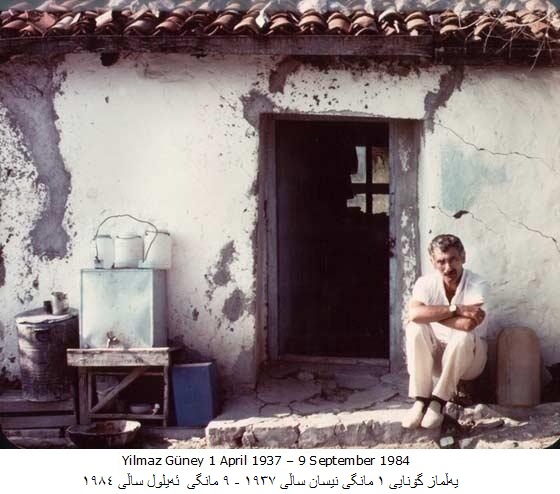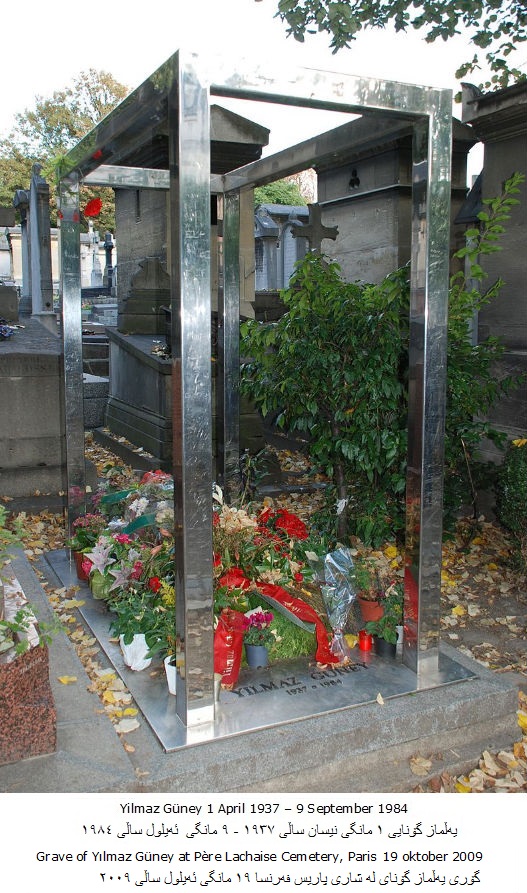
Yılmaz G�ney

Yılmaz G�ney was born in 1937 in the Yenice county (Yenice, Karataş) of Adana. His father was a Zaza-Kurd from Siverek, and his mother was a Kurmanci-Kurd from Varto, Turkey. He described himself as an "assimilated Kurd". His parents migrated to Adana to work as cotton field laborers. As a result of his family background young Yılmaz grew among the working class poor, which formed a strong background for his future works which generally focused on a realistic portrayal of down and out people in Turkey. G�ney studied law and economics at the universities in Ankara and Istanbul, but by the age of 21 he found himself actively involved in film-making.
Career in Turkey
As
Yeşil�am, the Turkish studio system, grew in
strength, a handful of directors, including Atıf Yılmaz,
began to use the cinema as a means of addressing the problems of the people.
Mostly, state-sanctioned melodramas, war films and play adaptations had
previously played in Turkish theaters, but these new filmmakers began to fill
the screens with more artistic, personal and relevant pictures of
Turkish/Kurdish life. Yılmaz G�ney was the most popular name to emerge from the
Young Turkish Cinema, a gruff-looking young actor who earned the moniker "�irkin
Kral," ("the Ugly King") or (pasha nashrin) in Kurdish.
After working as an apprentice screenwriter for and assistant to Atıf Yılmaz,
G�ney soon began appearing in as many as 20 films a year and became Turkey's
most popular actor.
Although the early 1960s brought problems for
freedom to Turkey, G�ney was imprisoned in 1961 for 18 months for publishing a "communist"
novel. The country's political situation and G�ney's relationship with the
authorities only became more tense in the ensuing years. Not content with his
star status atop the Turkey's film industry, G�ney began directing his own
pictures in 1965. By 1968 he had formed his own production company, G�ney
Filmcilik. Over the next few years, the titles of his films mirrored the
feelings of the people of Turkey: Umut (Hope,
1970); Ağıt (Elegy, 1972);
Acı (Pain, 1971);
The Hopeless (1971).
After 1972, however, G�ney would spend most of his life in prison. Arrested for harboring anarchist students, G�ney was jailed during preproduction of Zavallılar (The Miserable, 1975), and before completing Endişe (Worry, 1974), which was finished in 1974 by G�ney's assistant, Şerif G�ren. This was a cherished role that G�ren would repeat over the next dozen years, directing several scripts that G�ney wrote laboriously while behind bars.
Released from prison in 1974 as part of a general amnesty, G�ney was re-arrested that same year for shooting a judge Sefa Mutlu, the public prosecutor of Yumurtalık district in Adana Province, to death in a night club as a result of a drunken row and given a prison sentence of 19 years. During this stretch of incarceration, his most successful screenplays were S�r� (The Herd, 1978) and D�şman (The Enemy, 1979), both directed by Zeki �kten. D�şman won an Honourable Mention at the 30th Berlin International Film Festival in 1980.
"The Herd, in fact, is the history of the Kurdish people, but I could not even use the Kurdish language in this film; if we had used Kurdish, all those who took part in this film would have been sent to jail..." G�ney said in his last interview with journalist Chris Kutschera.
Exile and death
After escaping from prison in 1981 and fleeing to France, G�ney
won the Palme d'Or at the
1982 Cannes Film Festival for his film
Yol, whose
director in the field was once again Şerif G�ren. It was not until 1983 that
G�ney resumed directing, telling a brutal tale of imprisoned children in his
final film, Duvar
(The Wall, 1983), made in France with the cooperation of the French
government.

Yılmaz G�ney died of gastric cancer in 1984, in Paris, France.
Yılmaz G�ney Born 1
April 1937
Adana,
North Kurdistan Died 9 September 1984
(aged 47)
Paris, France
Occupation Film director
Actor Years active 1958
- 1983